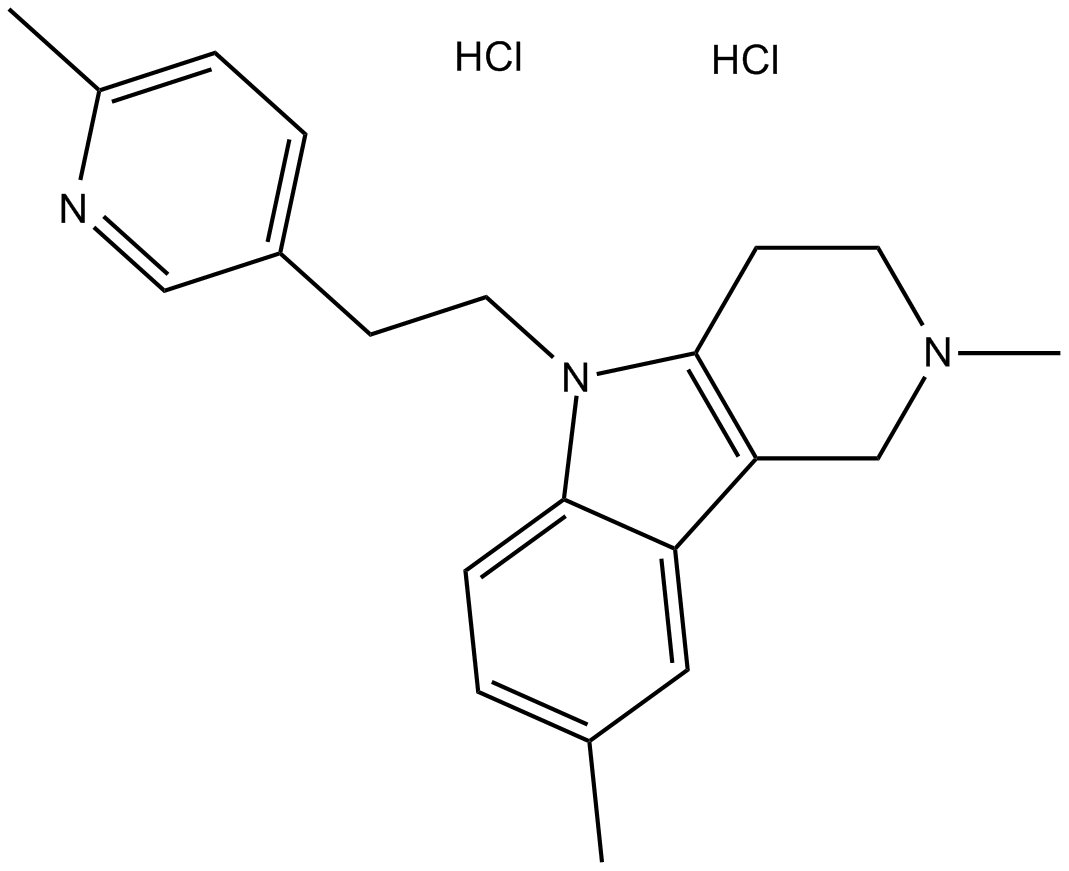Latrepirdine dihydrochloride (Synonyms: Dimebon, Latrepirdine) |
| Catalog No.GC17974 |
Latrepirdine is a neuroactive compound with antagonist activity at histaminergic, α-adrenergic, and serotonergic receptors.
Products are for research use only. Not for human use. We do not sell to patients.

Cas No.: 97657-92-6
Sample solution is provided at 25 µL, 10mM.
Latrepirdine dihydrochloride is a neuroactive compound with antagonist activity at histaminergic, α-adrenergic, and serotonergic receptors. Latrepirdine stimulates amyloid precursor protein (APP) catabolism and amyloid-β (Aβ) secretion.
Latrepirdine has been reported to possess several properties that are potentially relevant to the treatment of neurodegenerative diseases: (1) protection of cultured cells from the cytotoxicity of amyloid-β (Aβ) peptide; (2) stabilization of mitochondrial function and calcium homeostasis; (3) modulation of Aβ release from cultured cells, isolated intact nerve terminals, and from hippocampal neurons in living mouse brain; and (4) promotion of neurogenesis in the murine hippocampus. Treatment of cultured mammalian cells with Latrepirdine leads to enhanced mTOR- and Atg5-dependent autophagy. Latrepirdine modulates Atg5-dependent autophagic activity in a dose-dependent manner and via the mTOR-signaling pathway. HeLa cells stably expressing LC3 fused are treated with EGFP (eGFP-LC3) for 3 or 6 hours in the absence or presence of 50 μM Latrepirdine. Treatment with Latrepirdine for 3 or 6 hours markedly enhances the number of eGFP-LC3 punctae, indicating that Latrepirdine induces formation of autophagosomes. Next, mouse N2a neuroblastoma cells are treated in the absence (vehicle) or presence of 5 nM, 500 nM or 50 μM Latrepirdine for 3 or 6 hours in order to determine the effects of acute drug treatment on the regulation of autophagy. A significant and dose-dependent increase is observed in LC3-II levels in N2a cells following 3- or 6-hour treatment with either 500 nM or 50 μM Latrepirdine. A significant decrease of p-mTOR and p-S6K from N2a cells treated with 50 μM Latrepirdine for 3 hours is observed, whereas the total mTOR and p70S6K levels remain relatively constant[1].
Latrepirdine treatment of TgCRND8 transgenic mice is associated with improved learning behavior and with a reduction in accumulation of Aβ42 and α-synuclein. Male, 90-day-old TgCRND8 mice or their wild-type littermates (nTg) receive 31 consecutive once daily i.p. injections of either 3.5 mg/kg Latrepirdine or 0.9% saline (vehicle). At the culmination of treatment, mice are tested for cued and contextual fear conditioning using a paradigm that has been widely accepted for evaluating learning and memory deficits in APP transgenic mice. A significant increase in cued memory only among Latrepirdine-versus vehicle-treated TgCRND8 mice (p=0.01) is observed. A weak, non-significant trend toward an improvement in contextual memory among Latrepirdine-versus vehicle-treated mice (p=0.099) is also observed[1].
References:
[1]. Steele JW, et al. Latrepirdine improves cognition and arrests progression of neuropathology in an Alzheimer's mouse model. Mol Psychiatry. 2013 Aug;18(8):889-97.
Average Rating: 5 (Based on Reviews and 23 reference(s) in Google Scholar.)
GLPBIO products are for RESEARCH USE ONLY. Please make sure your review or question is research based.
Required fields are marked with *




















